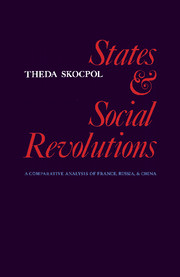Book contents
- Frontmatter
- Dedication
- Contents
- List of Tables and Maps
- Preface
- Introduction
- 1 Explaining Social Revolutions: Alternatives to Existieg Theories
- Part I Causes of Social Revolutions in France, Russia, amd China
- Part II Outcomes of Social Revolutions in France, Rusia, and China
- Conclusion
- Notes
- Bibliography
- Index
1 - Explaining Social Revolutions: Alternatives to Existieg Theories
Published online by Cambridge University Press: 05 August 2014
- Frontmatter
- Dedication
- Contents
- List of Tables and Maps
- Preface
- Introduction
- 1 Explaining Social Revolutions: Alternatives to Existieg Theories
- Part I Causes of Social Revolutions in France, Russia, amd China
- Part II Outcomes of Social Revolutions in France, Rusia, and China
- Conclusion
- Notes
- Bibliography
- Index
Summary
Revolutions are the locomotives of history.
Karl MarxControversy over different views of “methodology” and “theory” is properly carried on in dose and continuous relation with substantive Problems …. The character of these Problems limits and suggests the methods and conception that are used and how they are used.
C. Wright MillsSocial revolutions have been rare but momentous occurrences In modern world history. From France in the 1790s to Vietnam in the mid-twentieth Century, these revolutions have transformed State organizations, class structures, and dominant ideologies. They have given birth to nations whose power and autonomy markedly surpassed their own prerevolutionary pasts and outstripped other countries in similar circumstances. Revolutionary France became suddenly a conquering power in Continental Europe, and the Russian Revolution generated an industrial and military superpower. The Mexican Revolution gave its homeland the political strength to become one of the most industrialized of postcolonial nations and the country in Latin America least prone to military coups. Since World War II, the culmination of a revolutionary process long underway has reunited and transformed a shattered China And new social evolutions have enabled decolonizing and neocolonial countries such as Vietnam and Cuba to break the chains of extreme dependency.
Nor have social revolutions had only national significance. In some cases social revolutions have given rise to models and ideals of enormous international impact and appeal–especially where the transformed societies have been large and geopolitically important, actual or potential Great Powers.
- Type
- Chapter
- Information
- States and Social RevolutionsA Comparative Analysis of France, Russia and China, pp. 3 - 44Publisher: Cambridge University PressPrint publication year: 1979
- 1
- Cited by

